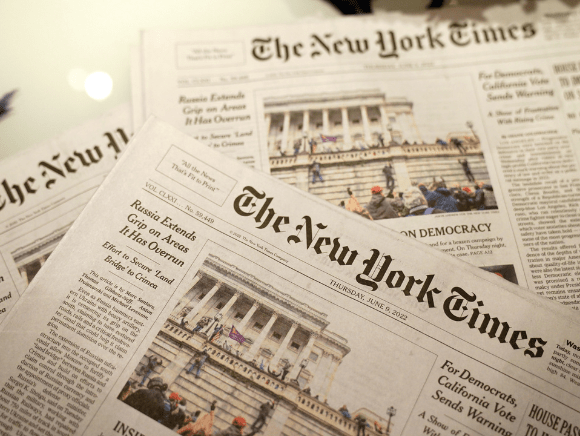
(Photo by Leigh Vogel/Getty Images for The New York Times)
There’s a saying that goes something like this: “An apology without change is just manipulation.” Reading the New York Times series of apologies by its columnists leaves the reader feeling that they are being played. Officially titled “I Was Wrong About,” the New York Times found a way to con its famed opinion writers into saying they are sorry about something they regret writing. These eight articles are an odd collection of mea culpas that project the image of a noble enterprise, yet one wonders if it is heartfelt regret or merely more virtue signaling. After all, forced regret is really no regret; thus, the Times’ condescension oozes from each of its myopic columnists.
This bizarre collection of articles read much like the friend who apologizes for posting an unattractive photo of you on their Facebook page but forgets to mention the two-paragraph screed they wrote tagging you a “dog-faced b—–.”

Times Condescension On Display
New York Times Opinion Editor Kathleen Kingsbury sounded loud and proud in hyping the apology articles on Twitter. “We’re presenting this collection because at Times Opinion, we hold firmly to the idea that good-faith intellectual debate is possible, that we should all be able to rethink our positions on all kinds of issues, from the serious to the trivial,” she asserted as her motivation for the series.
Lofty goals, indeed.
So, what do the Times’ columnists regret that is worth the rarified ink in the Gray Lady? Here are highlights from a few:
The Power of Protest by Zeynep Tufekci – Ms. Tufeckci regrets believing in the power of protest as an effective agent for change. An unusual topic to be sure, it is perhaps the most tortured of the mea culpas and poorly written to boot.
Al Franken by Michelle Goldberg – Goldberg claims grievous sins against Al Franken. “… I was wrong in thinking it was possible to separate what was fair to him and what was fair to everyone else.” So, the left has apologized to the left. Should we be deeply moved?
Facebook by Farhad Manjoo – Here’s what keeps Mr. Manjoo up at night: “Early in 2009, I offered the world some tech advice that I have regretted pretty much ever since: I told everyone to join Facebook,” he lamented. Again, an odd choice for a grievous sin.
But wait, there’s more.
David Brooks mourned his mistaken views about capitalism, Thomas Friedman bewailed his naivete over Chinese censorship, and Gail Collins expressed grief for going after Mitt Romney hammer and tong over putting his dog on the roof of a vehicle. Then there’s Paul Krugman, who admits to being wrong about inflation. Perhaps he should receive another Nobel Prize for such soul searching? Talk about stating the obvious.
However, the one article that might intrigue conservatives is Bret Stephens’ lamentation regarding Trump voters. He made sure to point out he was not reversing course on the Donald but felt that perhaps he was too hard on Trumpists. ‘I regret almost nothing of what I said about the man and his close minions. But the broad swipe at his voters caricatured them and blinkered me,” he wrote.

(Photo by: Avalon/Universal Images Group via Getty Images)
A little self-awareness might be in order here. Stephen’s apology merely exchanged one caricature of Trump voters for another. At length, he relayed his conversation with former Reagan speechwriter Peggy Noonan, who informed him that he should feel some sympathy for the “unprotected” Trump voter because these people are from a lower socio-economic class. “Their neighborhoods weren’t so safe and pleasant. Their schools weren’t so excellent. Their livelihoods weren’t so secure,” he opined.
Ah, the noblesse oblige have an obligation to exhibit benevolence toward the Trump voter. One wonders how Mr. Stephens would characterize the myriad Trump supporters who drive BMWs and Mercedes Benz vehicles? “Impossible,” he would surely sniff, “because everyone knows the deplorables are all red necks who drive pick-ups to church on Sundays and shop at Walmart.”
Such open stereotyping apparently never crossed the mind of Times editors who approved Stephen’s apology. In a way, the entire NYT “I was wrong” series has the distinct odor of the lords reaching down to the peasants with offers of bread and mead for sustenance. Kingsbury even said as much in her Twitter feed, “Even the smartest people, the most sophisticated analysts, the sharpest prognosticators must admit that yes, sometimes, they were off the mark.” Translation: from time to time, our betters must take pity on the plebian masses.
The problem is those who write for the newspaper of record are entirely unable to recognize the fishbowl they occupy. So much good could have come from this series had the effort been genuine. Why did the Times suppress the Hunter Biden laptop story? What was behind their obsession with the defunct FBI operation known as Crossfire Hurricane? How about a long overdue apology to their former science reporter Donald McNeil who was kicked to the curb for answering a question about the n-word? So many transgressions, such little time. For all these reasons and many more, the New York Times condescension series comes off as nothing more than an effort to patronize all the little people out there.
Remember to check out the web’s best conservative news aggregator
Whatfinger.com — the #1 Alternative to the Drudge


